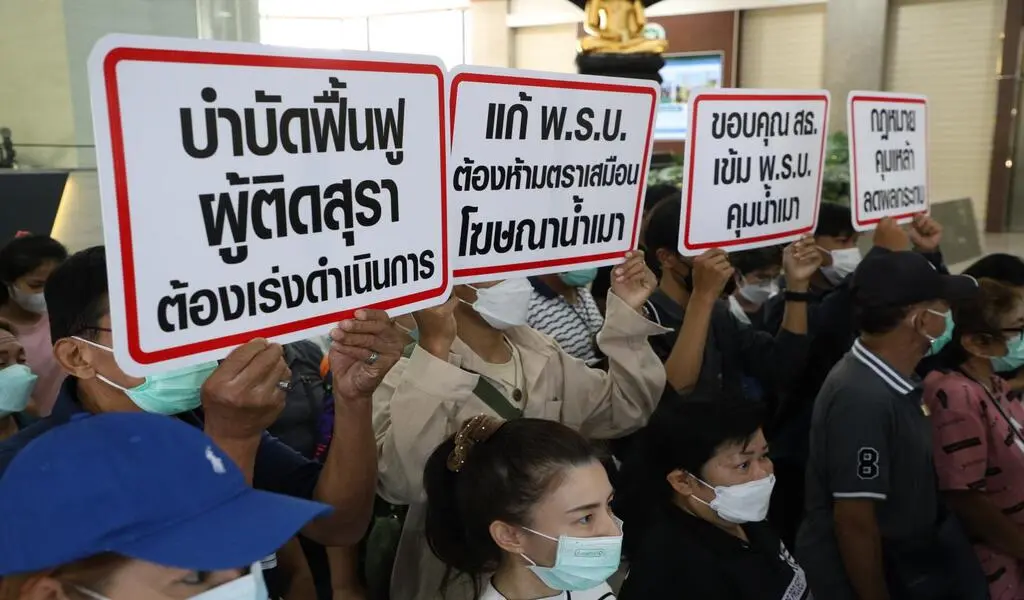News
Thailand’s Alcohol Control Laws: Debate Intensifies as Parliament Faces Four Drafts

(CTN News) — Four draft alcohol restriction measures will shortly be introduced in Parliament, but none appear to offer a compromise to satisfy everyone.
Two drafts, one presented by the Public Health Ministry’s Disease Control Department (DCD) and the other by an anti-alcohol group, call for stricter controls, ostensibly due to concerns about the health and other consequences of drinking.
Current Alcohol Control Measures in Thailand
The two other proposals, one produced by a pro-alcohol group and the other by Move Forward MP and craft-beer champion Taopiphop Limjittrakorn, aim to shatter the industry’s monopolistic conditions, which are dominated by a small number of brewing behemoths.
Along with these, the government’s eight-point recommendation will enter the debate.
Thailand has been one of the countries with strong limits on the promotion, sale, and consumption of alcohol since the Alcoholic Beverage Control Act was passed in 2008.
This Act prohibits advertising that directly or indirectly promotes an alcoholic beverage’s brand or trademark.
Displaying even a photograph of a glass of beer might result in a large fine.
“I’ve heard that one restaurant was fined close to 1 million baht once,” said Asst Prof Dr. Charoen Charoenchai, a lecturer at the Rajamangala University of Technology Thanyaburi’s Faculty of Agricultural Technology.
Charoen, who leads the organization behind one of the proposed alcohol liberalization bills, feels authorities have tightened control to the point that there is almost no room to breathe.
“I don’t think this Alcohol Beverage Control Law is normal since it authorizes the Alcoholic Beverage Control Board to add new stipulations.”
“Normally, legal changes should come from the legislature,” the lecturer stated.
Rumors say that the Alcoholic Beverage Control Board intends to label packages with images highlighting the risks of alcohol consumption.
Charoen claimed that authorities and officials would be given inappropriate powers if the DCD’s plan became law.
For example, officials could inspect brewers and merchants selling alcohol without a search warrant.
There are concerns that this would lead to corruption and harassment by unscrupulous officials.
“After reviewing the versions submitted by the DCD and the anti-alcohol group, I can conclude that their content is extreme. “It’s as if they want to prohibit any public mention of alcohol,” Charoen stated.
The DCD draft would also increase the maximum penalty for an offending manufacturer or importer from Bt500,000 to Bt1 million, plus up to one year in jail, or both.
According to Charoen, such a rigid approach would limit many people’s freedom and ability to earn a living.
Businesses that rely on tourists, for example, were concerned about disturbing images appearing on the packaging of alcoholic beverages, he stated.
He stated that the severe regulation also affects his field of education; while teaching about the creation of alcoholic beverages, the law prevents him from openly sharing his knowledge with his students.
“I can’t talk about content that can be useful, even though as a lecturer, I should be serving the public with my academic knowledge,” he told the audience.
“Similarly, manufacturers can’t communicate about their products with consumers either.”
Supapong Puenglampu, who represents small-scale liquor manufacturers, lamented that, despite having a liquor license and satisfying all manufacturing and sanitary criteria, alcohol producers like him continue to confront several issues under the Alcoholic Beverage Control Act.
“If we attempt to offer product information, our actions are interpreted as encouraging drinking. How can we promote our goods without describing what distinguishes it from competitors?”
He stated that while small and local producers must express their local identity, displaying a trademark or emblem can be difficult.
“Small manufacturers like ourselves are summoned to court.” If we cannot afford a legal battle, we will have to pay a fine at the Office of the Alcoholic Beverage Control Board.”
The Charoen-led group’s proposed bill aims to allow alcoholic beverages to be sold from vending machines, in businesses near campuses, and through round-the-clock promotional activities.
The draft offered by the Move Forward MP follows the same lines.
For example, it would remove restrictions on selling alcohol during specific hours, allowing people to drink wherever they wish, including public parks and educational institutions.
Prime Minister Srettha Thavisin, seeing that all four drafts reflect opposite sides of the discussion, entrusted PM’s Secretary-General Prommin Lertsuridej with developing suggestions for Parliament to consider alongside the foursome.
The eight-point suggestion, already approved by the Cabinet, aims to loosen Thailand’s strict alcohol consumption restrictions.
For example, it supports the selling of alcohol in hotels or venues near schoolchildren, as well as stadiums and concert halls.
It also advises repealing the prohibition on selling alcohol through vending machines and permitting marketing and discounts.
The era Watcharapranee, director of Stop-Drink Network Thailand, stated that the eight-point recommendation would weaken the country’s alcohol laws and benefit alcohol-related companies such as pubs and bars.
“The people will pay the price if you only please investors and businesses,” he said.
“If the consumption of alcohol rises, you will see more fatal road accidents from drunk driving.”
According to the National Statistical Office, the number of alcohol drinkers in Thailand has decreased by 2% since the Alcoholic Beverage Control Act was implemented in 2008.
The percentage of overall road-accident casualties hospitalized due to drunk driving during Thailand’s infamous “7 dangerous days” around the Songkran and New Year holidays has also decreased from 40% to 26 percent.
Before it was implemented, the Alcoholic Beverage Control Act received 13 million signatures of support, including Theera’s.
According to Associate Professor, Dr. Udomsak Saengow of Walailak University, the alcohol-control law is indeed useful, but those in authority are too consumed with the idea of liberalizing the sector to realize its merits.





























